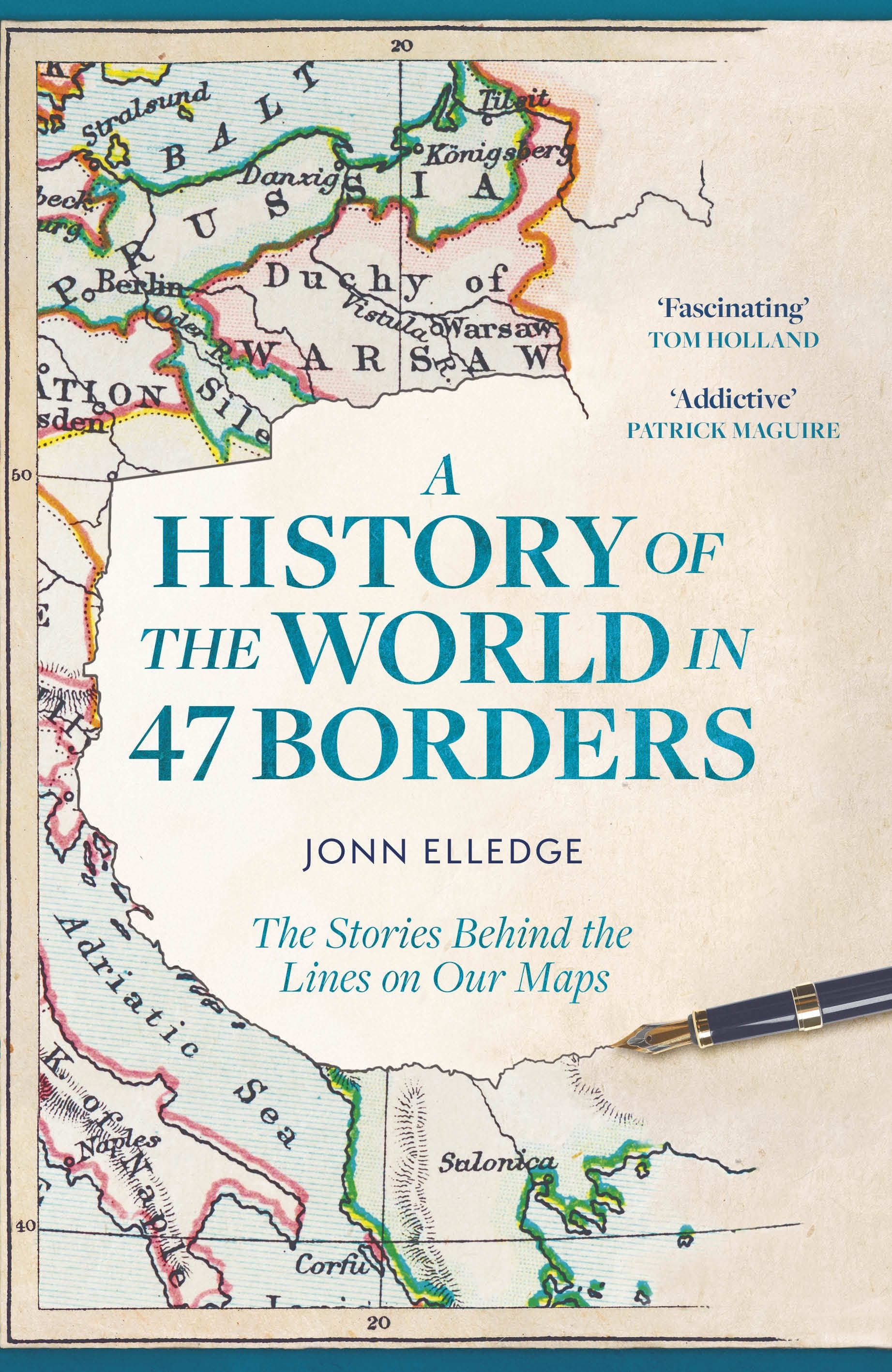Jonn Elledge: A History of the World in 47 Borders review - a view from the boundaries | reviews, news & interviews
Jonn Elledge: A History of the World in 47 Borders review - a view from the boundaries
Jonn Elledge: A History of the World in 47 Borders review - a view from the boundaries
Enjoyable journey through the byways of how lines on maps have shaped the modern world

In A History of the World in 47 Borders, Jonn Elledge takes an ostensibly dry subject – how maps and boundaries have shaped our world – and makes from it a diverting and informative read. It is light and conversational in tone, covering topics that range from the clearly important to the niche, showing Elledge’s eye for an entertaining story and an ability to pick up political hot potatoes without burning his fingers.
The 47 chapters are each about five pages long (none outstay their welcome) divided into three tranches: “Histories” (how the map of the world changed over time from the earliest records), “Legacies” (unusual and esoteric border issues of today, as bequeathed by previous generations) and “Externalities” (broadening things out to look at issues like the International Date Line, why the Prime Meridian is where it is, who owns Antarctica.) Why 47? I don’t know, apart from the fact of avoiding a round number is of a piece with its quirky outlook. I wouldn’t have complained about there being a few less, but there are no particularly obvious stories to be cut (although the editor could have been a bit tougher on the matter of footnotes, where Elledge is a bit self-indulgent.)
 The opening section has some tricky stretches: Elledge’s accounts of the development of medieval China, the Mongol empire, or the ebbs and flows of the Holy Roman Empire are fluent and not unclear, but the stories are so inescapably complex that it is a struggle to follow them. I took away things I didn’t know, or hadn’t previously thought about: why Europe is essentially a made-up continent, what “margraves” originally were and why they mattered, and how improved map-making technology of the 17th century made possible the colonial carving up of other lands by the stroke of a pen in a European capital. Above all, I was made aware of how much of the history of my own nation I don’t really know about (often things that don’t reflect well on our forefathers) let alone that of other parts of the world. In this way the book is a nudge to go out and read more widely: many of the chapters feel like they deserve their own book.
The opening section has some tricky stretches: Elledge’s accounts of the development of medieval China, the Mongol empire, or the ebbs and flows of the Holy Roman Empire are fluent and not unclear, but the stories are so inescapably complex that it is a struggle to follow them. I took away things I didn’t know, or hadn’t previously thought about: why Europe is essentially a made-up continent, what “margraves” originally were and why they mattered, and how improved map-making technology of the 17th century made possible the colonial carving up of other lands by the stroke of a pen in a European capital. Above all, I was made aware of how much of the history of my own nation I don’t really know about (often things that don’t reflect well on our forefathers) let alone that of other parts of the world. In this way the book is a nudge to go out and read more widely: many of the chapters feel like they deserve their own book.
The middle section is the most entertaining: vignettes of odd or even silly situations that persist in the modern world for really no good reason. The village that is half in the Netherlands and half in Belgium, the bit of desert that neither Sudan nor Egypt want to claim (as it would prejudice other claims elsewhere), or the reason Washington DC is the peculiar square-with-a-bite-taken-out shape that it is. Elledge looks at some wider questions of what borders are, and how “given a distant enough perspective by time or geography, almost any boundary can become baffling to the point of meaninglessness.” What started out, in deep history, as attempts to mark the very edges of where a tribal leader’s writ ran, have become flashpoints – Kashmir, the Korean DMZ – that could, even today, set off a military conflict.
But the moments of seriousness are diluted by the jovial tone of most of the book and Elledge’s almost puppyish enthusiasm for his subject matter. His delight in sharing the things he has discovered shines through; it is like spending an evening in the pub with an entertaining pal. Elledge treads carefully when tackling sensitive issues such as Israel and Palestine (“I’m going to confess something at this point: I’ve been dreading this bit.”) or the partition of India, where he is scornful of Mountbatten’s failings, but clearly more comfortable when discussing things like the “ghost stations” of the divided Berlin’s U-Bahn. Borders, he concludes, are a necessary evil. “The division between people like us and people like them, have been with us for the entirety of human history.” And that’s not likely to change.
- A History of the World in 47 Borders by Jonn Elledge (Wildfire, £25)
- More book reviews on theartsdesk
The future of Arts Journalism
You can stop theartsdesk.com closing!
We urgently need financing to survive. Our fundraising drive has thus far raised £49,000 but we need to reach £100,000 or we will be forced to close. Please contribute here: https://gofund.me/c3f6033d
And if you can forward this information to anyone who might assist, we’d be grateful.

Subscribe to theartsdesk.com
Thank you for continuing to read our work on theartsdesk.com. For unlimited access to every article in its entirety, including our archive of more than 15,000 pieces, we're asking for £5 per month or £40 per year. We feel it's a very good deal, and hope you do too.
To take a subscription now simply click here.
And if you're looking for that extra gift for a friend or family member, why not treat them to a theartsdesk.com gift subscription?
more Books
 'We are bowled over!' Thank you for your messages of love and support
Much-appreciated words of commendation from readers and the cultural community
'We are bowled over!' Thank you for your messages of love and support
Much-appreciated words of commendation from readers and the cultural community
 Samuel Arbesman: The Magic of Code review - the spark ages
A wide-eyed take on our digital world can’t quite dispel the dangers
Samuel Arbesman: The Magic of Code review - the spark ages
A wide-eyed take on our digital world can’t quite dispel the dangers
 Zsuzsanna Gahse: Mountainish review - seeking refuge
Notes on danger and dialogue in the shadow of the Swiss Alps
Zsuzsanna Gahse: Mountainish review - seeking refuge
Notes on danger and dialogue in the shadow of the Swiss Alps
 Patrick McGilligan: Woody Allen - A Travesty of a Mockery of a Sham review - New York stories
Fair-minded Woody Allen biography covers all bases
Patrick McGilligan: Woody Allen - A Travesty of a Mockery of a Sham review - New York stories
Fair-minded Woody Allen biography covers all bases
 Howard Amos: Russia Starts Here review - East meets West, via the Pskov region
A journalist looks beyond borders in this searching account of the Russian mind
Howard Amos: Russia Starts Here review - East meets West, via the Pskov region
A journalist looks beyond borders in this searching account of the Russian mind
 Henry Gee: The Decline and Fall of the Human Empire - Why Our Species is on the Edge of Extinction review - survival instincts
A science writer looks to the stars for a way to dodge our impending doom
Henry Gee: The Decline and Fall of the Human Empire - Why Our Species is on the Edge of Extinction review - survival instincts
A science writer looks to the stars for a way to dodge our impending doom
 Jonathan Buckley: One Boat review - a shore thing
Buckley’s 13th novel is a powerful reflection on intimacy and grief
Jonathan Buckley: One Boat review - a shore thing
Buckley’s 13th novel is a powerful reflection on intimacy and grief
 Help to give theartsdesk a future!
Support our GoFundMe appeal
Help to give theartsdesk a future!
Support our GoFundMe appeal
 Jessica Duchen: Myra Hess - National Treasure review - well-told life of a pioneering musician
Biography of the groundbreaking British pianist who was a hero of the Blitz
Jessica Duchen: Myra Hess - National Treasure review - well-told life of a pioneering musician
Biography of the groundbreaking British pianist who was a hero of the Blitz
 Shon Faye: Love in Exile review - the greatest feeling
Love comes under the microscope in this heartfelt analysis of the personal and political
Shon Faye: Love in Exile review - the greatest feeling
Love comes under the microscope in this heartfelt analysis of the personal and political
 Philip Marsden: Under a Metal Sky review - rock and awe
Myths, mines, and mankind combine in this wide-eyed reading of the earth beneath our feet
Philip Marsden: Under a Metal Sky review - rock and awe
Myths, mines, and mankind combine in this wide-eyed reading of the earth beneath our feet
 Jacqueline Feldman: Precarious Lease review - living on the edge
The trials and triumphs of a city’s margins are observed by an outside eye
Jacqueline Feldman: Precarious Lease review - living on the edge
The trials and triumphs of a city’s margins are observed by an outside eye

Add comment